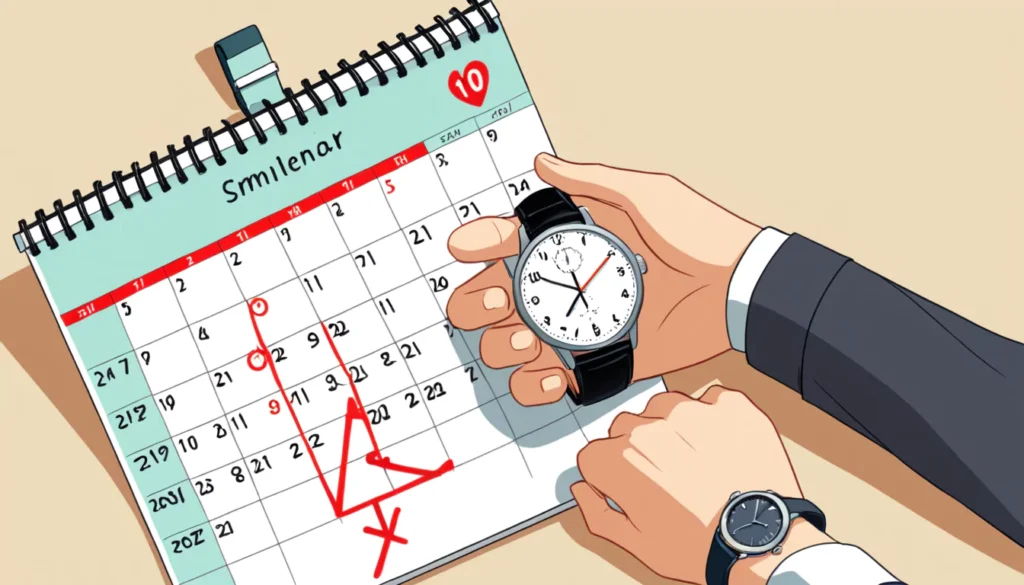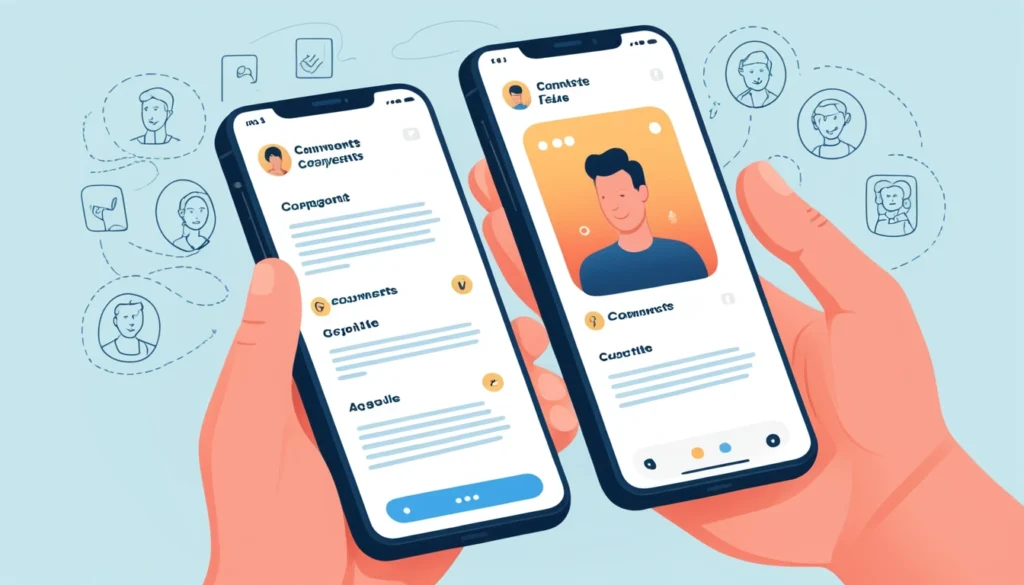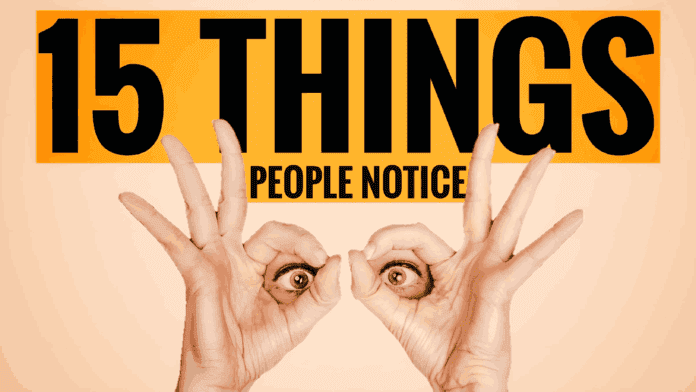Ever wondered what others pick up about you that you may never notice? Our habits, body language, and small quirks reveal a lot more than we think! Today, we’re diving into exactly what people notice about you when they first meet you—and how you can use this awareness to shape a positive first impression. Ready to uncover these subtle cues and take control of your perception? Let’s get started!
1. Your Body Language

Ever noticed how someone’s posture can tell you a lot? If you’re standing tall with open, relaxed gestures, people perceive you as confident. But if you’re slouching or closed off, it can look like you’re nervous or uninterested.
How to Make it Better: Stand tall, keep your shoulders relaxed, and make sure your hands aren’t clenched or hidden. Think about how you’d stand if you were feeling great—that energy will naturally come across.
2. Eye Contact

This one’s huge! People can tell a lot just by whether you make eye contact or avoid it. Strong eye contact can make you seem trustworthy and engaged, while avoiding it might come off as insecure or uninterested.
How to Make it Better: Try to hold eye contact a bit longer than you might naturally—don’t stare, but make it clear you’re paying attention. It’s like saying, “I’m here with you” without words.
3. Listening Skills

When someone’s talking to you, are you fully present, or does your mind wander? People pick up on this instantly. Being a good listener makes people feel valued and heard, while distractions or interruptions can feel disrespectful.
How to Make it Better: Practice active listening—nod, make little “uh-huh” or “I see” comments, and avoid checking your phone. Show them they’re the most interesting person in the room, even if it’s just for those few minutes.
4. Energy Level

Are you more of a high-energy, animated person, or do you have a calm, laid-back vibe? Both can work, but too much of either might make people feel overwhelmed or like you’re disinterested.
How to Make it Better: Match your energy to the setting. At a social event, bring up your energy; in a calm conversation, keep it grounded. Adapting shows you’re in sync with the people around you.
5. Voice Tone and Volume

The way you speak has a huge impact. A soft, calm tone can make you seem thoughtful, while a loud, intense voice might come off as aggressive (even if that’s not your intention).
How to Make it Better: Keep your tone steady and your volume moderate. Think about how you’d speak if you were sharing good news with a friend—warm and clear.
6. How You Handle Stress

People notice how you react under pressure—whether you stay calm or get visibly frustrated. If you’re cool and collected, it makes you seem reliable and in control.
How to Make it Better: Practice deep breathing or take a pause before reacting. Showing resilience under stress gives people confidence in you, like, “This person can handle anything!”
7. Small Acts of Kindness

Simple gestures like holding a door open, saying “please” and “thank you,” or offering to help someone can really make an impression. Kindness stands out more than we realize.
How to Make it Better: Look for little ways to be kind. Smile, lend a hand when you can, or compliment someone’s efforts. These small actions leave a lasting impression.
8. Reliability

People remember if you consistently show up and keep your promises. Being reliable builds trust, while flakiness can hurt people’s confidence in you.
How to Make it Better: If you commit to something, follow through. Even if it’s as simple as texting back when you say you will, these small acts of consistency mean a lot.
9. Fashion Sense or Personal Style

The way you dress tells people something about you, whether you mean it to or not. It’s an easy way for people to gauge personality or professionalism.
How to Make it Better: Choose clothes that make you feel confident and match the setting. You don’t have to be super fashionable—just thoughtful. When you look put-together, it shows you care.
10. Punctuality

Being on time is more than a clock thing—it shows respect for others’ time. When you’re late, people can feel like you’re undervaluing their schedule.
How to Make it Better: Plan to arrive a bit early. It’s better to wait a few minutes than to rush in feeling flustered, and it shows you’re considerate of others.
11. Self-Care and Hygiene

The little things, like fresh breath, neat hair, and clean clothes, are more noticeable than we think. They give people a sense of how much you take care of yourself.
How to Make it Better: Maintain a simple hygiene routine. Keep a mini deodorant or breath mints handy, especially before important meetings or social events.
12. Social Media Presence

Your online presence is part of your “first impression” nowadays. People notice your posts, comments, and the kind of content you share—it tells them a lot about your interests and values.
How to Make it Better: Be mindful of what you post and engage with. Aim to keep it positive, respectful, and true to who you are. Your online behavior reflects your real-life personality.
13. How You Treat Service Staff

This one’s a biggie! The way you interact with waitstaff, cashiers, or anyone providing a service speaks volumes about your empathy and respect for others.
How to Make it Better: Treat everyone with kindness, regardless of their role. People notice when you’re polite and respectful, especially when it’s not required.
14. Sense of Humor

Whether you’re playful, witty, or more on the serious side, humor leaves a memorable impression. But sometimes humor can fall flat if it’s too sarcastic or inappropriate for the situation.
How to Make it Better: Keep humor light, positive, and avoid controversial topics. A warm sense of humor can help people feel more comfortable around you.
15. How You Respond to Criticism

People notice whether you’re open to feedback or get defensive. Being able to handle criticism gracefully shows maturity and willingness to improve.
How to Make it Better: When someone gives feedback, take a moment before responding. Thank them and consider their points. Staying calm and receptive makes you seem open-minded and resilient.
Bonus: Too Much Availability Can Lead to Less Value
This one’s easy to overlook, but when you’re always available—like instantly responding to every message, jumping at every request, or always saying “yes” to plans—it can actually diminish how much others value your time. People often appreciate what feels rare or intentional; being “too available” might unintentionally lead them to take you for granted.
How to Make it Better: Set healthy boundaries. For example, if you’re constantly replying to work emails after hours, try scheduling a specific time during the day to handle them instead of being on call 24/7. Similarly, when friends ask to meet up, consider saying, “I’d love to, but I have other plans—let’s find a time that works for both of us.” By being a bit more selective and creating some distance, people will start to respect and appreciate the time you give them more. Plus, it allows you to recharge and stay present in each interaction.
Remember, the way people perceive you often hinges on subtle cues that you might not even realize you’re giving off. By being mindful of these factors and making small adjustments, you can shape a more positive impression in the eyes of others. Whether it’s through your body language, listening skills, or how you manage your availability, each aspect contributes to the overall narrative you present. So, take these insights to heart and watch how your interactions improve!
Thanks For Visiting, Explore More Similar Topics At Firethering 🙂



Very Helpful Thanks for Sharing 🙂